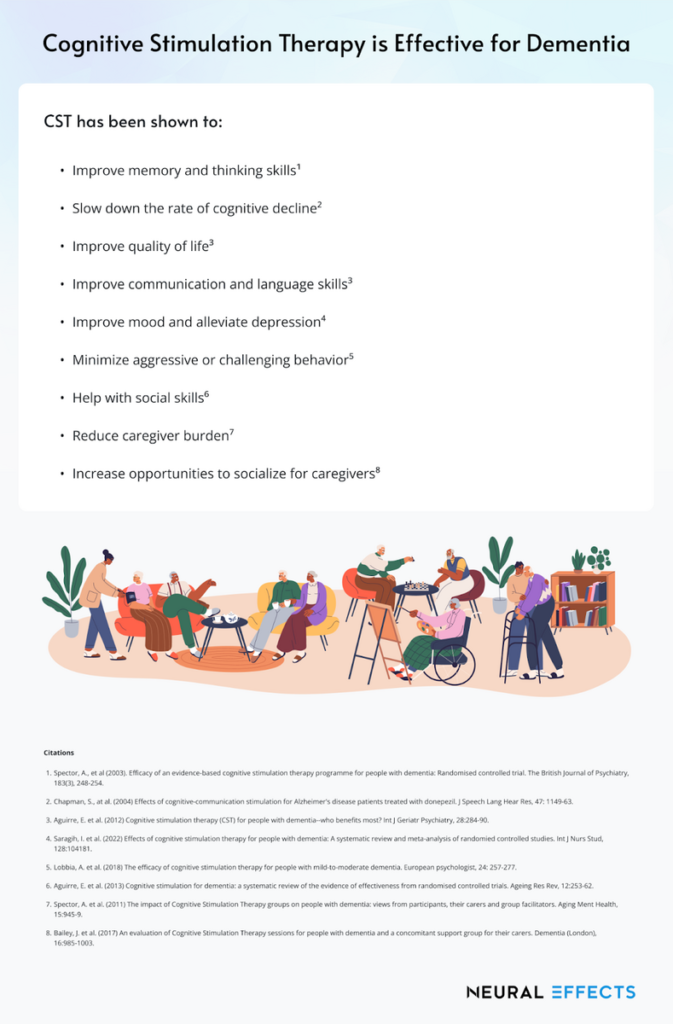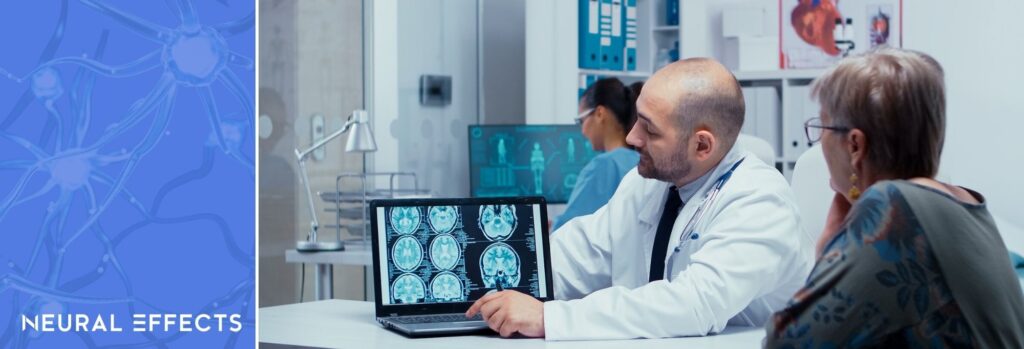Maybe your loved ones tell you your memory is starting to lapse, maybe you’re struggling with normal tasks and feeling frustrated, or maybe you don’t feel as sharp as you used to. Or, perhaps you have a dementia diagnosis already and you know it’s affecting your cognitive skills. Whatever the case, prompt assessment and treatment at a memory clinic is the best way to slow down cognitive decline.
There are many options for dementia treatment. You can go to your family doctor and get referrals for different specialists. But this way often involves navigating different services in different locations, which can be time consuming and frustrating, not to mention that it may take a long time to see the right doctor for you.
A good memory clinic will cover more services under one roof — or at the very least, help coordinate care within a group of trusted providers. Memory clinics often provide assessment and diagnosis, treatment, and support for your loved ones. At Neural Effects, our team includes neurologists, psychologists, and therapists specializing in dementia treatment who work together to provide you with state-of-the-art care.
In this article, we’ll cover:
- What can I get from a memory clinic?
- How will I be assessed for dementia?
- What treatment will I receive at a clinic?
- How can I choose the best memory clinic for me?
- Where can I find a memory clinic near me?
Neural Effects uses the latest evidence-based techniques to diagnose and help dementia patients. We are located in Provo, Utah, and serve anyone in Salt Lake City or the Utah Valley area. We are in network for most types of medical insurance. Schedule your evaluation today.
What Is a Memory Clinic?

A memory clinic (or dementia clinic) is a place where patients with memory loss and other cognitive issues can get access to a wide range of treatments. This includes patients who already have a diagnosis of Mild Cognitive Impairment (MCI) or dementia, as well as those who have noticed cognitive changes they want assessed.
Many clinics offer general dementia evaluations, while others may be able to identify the type of dementia (Alzheimer’s, vascular dementia, Lewy Body dementia, frontotemporal dementia, and related dementias). Memory clinics may offer multiple treatment approaches, including a combination of medication (when appropriate) and therapy. If they don’t offer all needed treatments in-house, then they should maintain relationships with local providers to coordinate care.
This multidisciplinary approach works well for patients. Visiting a memory clinic:
- Leads to fewer ER visits and hospitalizations
- Improves cognitive and emotional symptoms
- Leads to an earlier diagnosis
- Leaves patients happier with their care
- Decreases the burden on caregivers and results in higher satisfaction with their loved one’s care
- Results in shorter waiting times to see a doctor and a faster route to diagnosis
Memory clinics are also a source of support and information for caregivers and family members. Trained staff can help patients and their loved ones adapt to a dementia diagnosis and teach them strategies and lifestyle changes to delay the progression of symptoms. Follow the hyperlink to learn more about lifestyle changes and ways to deal with dementia at home that can help dementia patients live independently for longer.
How Will I Be Assessed at a Memory Clinic?

In memory clinics, primary care doctors and therapists can use several methods to assess new patients.
Typically, a healthcare provider will start by asking general questions about the patient’s overall health, medical records, and current medications. Then, they will move on to assess how memory deficits and other cognitive disorders have impacted the patient’s life, including the ability to carry out daily tasks such as hygiene care and cooking, as well as changes in mood and behavior.
Most memory clinics also provide a series of exams, including:
- A physical exam to assess motor function.
- A cognitive exam to assess memory, problem-solving, attention, language, and other cognitive skills.
- A psychological evaluation to detect signs of anxiety and depression.
Some patients may need medical tests, such as blood and urine tests, or brain imaging scans, such as a CT or MRI, to rule out other possible conditions. This might be done in-clinic or referred to an outside provider.
How Do We Assess Patients at Neural Effects?
At Neural Effects, we offer an initial dementia evaluation that takes about 2 to 2.5 hours to complete. We use a series of standardized tests that the patient repeats over time to assess progress.
All patients must complete these exams, even if they already have a dementia diagnosis. The results help our team develop a comprehensive care plan. For patients who don’t have a diagnosis yet, we can coordinate with their doctor to determine whether they have dementia and, if possible, what type.
After this evaluation, we gather all results together and write a cognitive care plan (CCP) specifically for each patient. Even patients who don’t have dementia receive their CCP because it offers advice to protect and improve cognitive health. The CCP includes:
- Diagnosis
- Results from the assessment
- Risk factors and how the disease is likely to progress
- Lifestyle changes that may help the patient
- How the family can get involved
- Recommended treatment options at Neural Effects (if applicable)
How Will a Memory Clinic Treat Me?

The services offered at memory clinics vary widely, but good clinics should provide a multidisciplinary approach to manage and treat symptoms relating to memory problems and other cognitive impairments. Health professionals should include a mix of memory experts, including geriatricians, neurologists, neuropsychologists, therapists, and nurse practitioners who are highly trained in dementia care.
Memory clinics typically offer some form of cognitive therapy to delay the progression of cognitive decline and help dementia patients live independently for longer. This can be combined with other types of therapy, such as physical therapy or occupational therapy, as well as dementia medication to delay cognitive degeneration.
Here’s a thorough description of the medications and therapies you might encounter at a memory clinic: 24 Dementia Interventions and Treatment for Mild Cognitive Impairment.
How Do You Treat Patients at Neural Effects?
At Neural Effects, we offer the EMPOWER program, a treatment plan which combines a type of cognitive therapy called cognitive stimulation therapy (CST) with physical exercise to help delay the progression of symptoms.
CST is one of the best available therapies for dementia patients. You can read more about cognitive stimulation therapy for dementia here.

Our treatment includes 14 sessions, which run twice a week for seven weeks. Sessions start with 10-15 minutes of aerobic exercise, typically done on a stationary bike. Our patient’s safety is paramount to us, and our therapists are trained to adapt these exercise sessions to what patients can do without serious risk of injury.
These sessions are a vital part of treatment. Physical exercise promotes blood flow to the brain and triggers a phenomenon called post-exercise cognitive boost (PECB). In turn, PECB promotes the release of a chemical in the brain called brain-derived neurotrophic factor (BDNF), which makes the brain more receptive to change and boosts the impact of therapy.
After exercise, patients engage in cognitive stimulation therapy. This includes activities to stimulate cognitive skills, including word games and puzzles, as well as creative and practical activities. Two trained facilitators work with a group of six patients. These facilitators help the group stay focused and promote socialization among participants.

If, at the end of the treatment, our therapists believe patients would benefit from additional types of therapy, we refer them to the appropriate specialists, such as neurologists or psychologists.
We also emphasize helping the families of those who have dementia. Family members are invited to attend the patient’s first visit to learn about CST and help repeat the exercises at home. We also educate caregivers about the challenges of dealing with dementia and suggest community resources, support groups, and other support services both for the patients and their caregivers.
Neural Effects uses the latest evidence-based techniques to diagnose and help dementia patients. We are located in Provo, Utah, and serve anyone in Salt Lake City or the Utah Valley area. We are in network for most types of medical insurance. Schedule your evaluation today.
Practical Tips for Choosing a Memory Clinic

Obviously, we recommend our services if you live in Provo, Salt Lake City, or the surrounding Utah Valley area. We offer a thorough and detailed assessment, as well as treatment combining CST and physical exercise. To our knowledge, we’re the only memory clinic in the U.S. offering this combination.
However, we understand that you may not be able to come to us for treatment. Here, we offer some tips to consider when choosing a memory clinic for you or a loved one.
- Before committing to a specific clinic, take your time to find out more about what they offer as patient care. As mentioned earlier, good clinics should provide a multidisciplinary team with different types of doctors and specialists.
- Contact your chosen clinic(s) and ask questions:
- What type of insurance do you accept?
- Do I need a referral from my family doctor?
- What treatment do you offer?
- How long does treatment last?
- What support do you offer for families?
- Find out the level of experience the doctors and therapists have when it comes to dealing with dementia patients. Ideally, you’re looking for highly trained and experienced providers with certification in their chosen field.
- If possible, speak to previous patients to see if the clinic would be a good fit for you.
Ultimately, you need to find a clinic where you feel comfortable and trust the team.
Further reading: What Makes Dementia Worse?
Where Can I Find a Memory Clinic Near Me?

There are multiple memory clinics currently operating in the U.S. Not all offer CST like Neural Effects but, to the best of our knowledge, all clinics in this list offer some form of therapy to slow down cognitive decline. This might include games to challenge the brain, reminiscence therapy, music therapy, and/or speech therapy, for example.
Inclusion in this list does not mean we endorse their services; it’s your responsibility to check what they offer and whether they’re a good fit for the patient.
Memory Clinics in Alabama
- UAB Brain Aging and Memory Clinic
- Brookwood Clinic
- Brookdale Senior Living
- Encore Respite
- Touching Hearts Senior Care
Memory Clinics in Alaska
Memory Clinics in Arizona
- The Enclave at Anthem Senior Living
- Shadow Mountain Memory Care
- Clarendale Arcadia
- A.T. Still University of Health Sciences
Memory Clinics in Arkansas
- Washington Regional Memory Disorders Clinic
- UAMS Donald W. Reynolds Institute on Aging
- Arkansas Longevity Center
Memory Clinics in California
- UCSF Memory and Aging Center
- Stanford Memory Disorders Center
- UCLA Alzheimer’s and Dementia Care Program
- UC Davis Alzheimer’s Disease Center
- Hollywood Healthy Living
Memory Clinics in Colorado
Memory Clinics in Connecticut
- The Memory Care Center
- Institute of Living – The Braceland Center for Memory & Aging
- CT Dementia Help
- Anthology Senior Living
- LiveWell
Memory Clinics in Delaware
- ChristianaCare Swank Center for Memory Care and Geriatric Consultation
- HarborChase of Wilmington (an assisted living facility offering cognitive therapy)
Memory Clinics in Florida
- Memory Disorder Clinic at Palm Beach Neuroscience Institute
- USF Health Memory Disorder Clinic
- Health First Memory Disorder Clinic
- Memory Treatment Centers of Jacksonville
- My Memory Clinic
- Lee Health Memory Care
- FitMinds
- Anthology Senior Living
- Abbey Delray (Delray Beach)
Memory Clinics in Georgia
- Columbus Memory Center
- Memory Matters Glynn (memory screening and resources)
- Hope Assisted Living & Memory Care Center (an assisted living facility offering cognitive therapy)
Memory Clinics in Hawaii
Memory Clinics in Idaho
- Ashley Manor Memory Care (offers some forms of therapy)
- YA Partners Group
Memory Clinics in Illinois
- Advocate Memory Center
- RUSH Memory Clinic
- Northwestern Neurobehavior and Memory Clinic
- Thomson Memory & Attention
- Oak Trace Senior Living
- Terra Vista
Memory Clinics in Indiana
- Warsaw Meadows Care Center – Dementia Care Specialist
- Life Care Center of LaGrange
- Northwestern Neurobehavior and Memory Clinic
- IU Health Neuroscience Center
- Anthology Senior Living
Memory Clinics in Iowa
Memory Clinics in Kansas
- KU Alzheimer’s Disease Center (diagnosis and resources)
- Anthology Senior Living
Memory Clinics in Kentucky
- Heartsong Memory Care (cognitive activities)
- Sam Swope Care Center
- Anthology Senior Living
Memory Clinics in Louisiana
- Cognitive Assessment and Memory Program (CAMP)
- The Verandah Assisted Living & Memory Care (cognitive therapy)
Memory Clinics in Maine
- Northern Light Acadia Hospital
- Atria Kennebunk (various therapies)
Memory Clinics in Maryland + District of Columbia
Memory Clinics in Massachusetts
- Anthology Senior Living
- Boston Center for Memory
- Wolk Center for Memory Health
- Massachusetts Alzheimer’s Disease Research Center
Memory Clinics in Michigan
- Anthology Senior Living
- East Ann Arbor Health and Geriatrics Center
- Wellspring Lutheran Services Senior Living Campus Memory Support (offers different therapies)
Memory Clinic in Minnesota
- Salt and Light Cognitive Coaching
- Friendship Village of Bloomington
- University of Minnesota Physicians St. Louis Park Memory Care Program
- The Orr Memory Clinic
Memory Clinics in Mississippi
Memory Clinics in Missouri
- A.T. Still University of Health Sciences
- Perry County Memorial Hospital
- SLUcare (St Louis University)
- Southeast Missouri State University
- Anthology Senior Living
- Washington University School of Medicine (virtual sessions)
- Missouri Memory Center
Memory Clinics in Montana
Memory Clinics in Nebraska
Memory Clinics in Nevada
Memory Clinics in New Hampshire
Memory Clinics in New Jersey
Memory Clinics in New Mexico
- UNM Adult Psychiatric Center
- Haciendas at Grace Village (an assisted living facility offering memory care)
Memory Clinics in New York
- The Barbara and Maurice Deane Center for Wellness and Cognitive Health
- The New York Memory & Healthy Aging Services
- Pearl Barlow Center
Memory Clinics in North Carolina
- Novant Health Memory Care – Kimel Park
- Atrium Health Wake Forest Baptist Kulynych Memory Assessment Clinic
- Memory & Movement Charlotte
- Alzheimer’s Memory Center
- Novant Health Memory Care – Southpark
- Mountain Memory Assessment
Memory Clinics in North Dakota
Memory Clinics in Ohio
Memory Clinics in Oklahoma
Memory Clinics in Oregon
Memory Clinics in Pennsylvania
- Anthology Senior Living
- Friendship Village of South Hills
- Penn Memory Center
- Second Family Memory Care Center
- Dementia Prevention Center
- Apex Psychological Care & Memory Center
- Geisinger Memory and Cognition Clinic – Wilkes Barre
Memory Clinics in Rhode Island
- Alzheimer’s Disease and Memory Disorders Center at Rhode Island Hospital
- Briarcliffe Gardens Memory Care Assisted Living (offers multiple therapies)
Memory Clinics in South Carolina
Memory Clinics in South Dakota
- Countryside Hospice Support & Memory Center
- Dow Rummel Village (offers multiple therapies)
Memory Clinics in Tennessee
- Vanderbilt Memory and Aging Clinic
- Pat Summitt Clinic
- Alzheimer’s Tennessee (offers cognitive screenings)
Memory Clinics in Texas
- The Memory Clinic of Texas
- Baylor Neuroscience Center, Memory Center
- UTHealth Neurosciences Neurocognitive Disorders Center — Memory Disorders Clinic
- Anthology Senior Living
- Edgemere (Dallas) (an assisted living facility offering memory care)
- Meadow Lake (Tyler) (an assisted living facility offering memory care)
- Querencia (Austin) (an assisted living facility offering memory care)
- The Stayton (Fort Worth) (an assisted living facility offering memory care)
Memory Clinics in Utah
- Neural Effects
- Memory Matters Utah (offers cognitive activities)
Memory Clinics in Vermont
Memory Clinics in Virginia
Memory Clinics in Washington
Memory Clinics in West Virginia
Memory Clinics in Wisconsin
- The Pines Post-Acute and Memory Care
- Wisconsin Alzheimer’s Disease Research Center
- Azura Memory Care of Manitowoc
Memory Clinics in Wyoming
Neural Effects uses the latest evidence-based techniques to diagnose and help dementia patients. We are located in Provo, Utah, and serve anyone in Salt Lake City or the Utah Valley area. We are in network for most types of medical insurance. Schedule your evaluation today.
